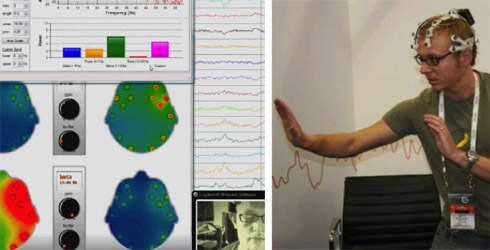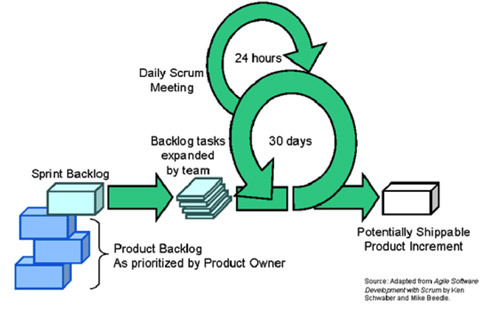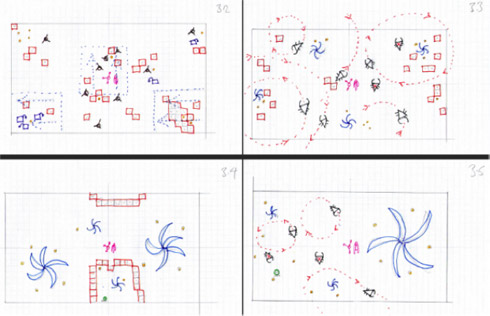Changing the University Genome: a Case Study of Digital Media Kingston
Karen Cham, Kingston University
Digital Media Kingston (DMK) is a cross-faculty project at Kingston University that aims to transcend the inherited boundaries between the arts and sciences and education and industry to ensure a synergy between teaching, research and enterprise to provide an industry-focused learning experience. Vocational education in digital media must firstly be interdisciplinary, as the practice itself is ...

Keywords: digital media, postgraduate, enterprise, research, practice, vocational
Abstract
Digital Media Kingston (DMK) is a cross-faculty project at Kingston University that aims to transcend the inherited boundaries between the arts and sciences and education and industry to ensure a synergy between teaching, research and enterprise to provide an industry-focused learning experience. Vocational education in digital media must firstly be interdisciplinary, as the practice itself is a convergence of the aesthetic, social and technical, but the teaching must also be research-engaged. The field moves so fast, it is only by integrating research and innovation that you can provide a ‘future proof’ education that can arm graduates to compete within the market place.
Context and rationale
In games development it is imperative that team members are able to discuss issues using the context and language of their colleagues, no matter whether their focus is technical, creative or artistic. By bringing these disciplines together, Digital Media Kingston is ensuring their students will have exactly the right mindset, experience and skills that they need to perform in the creative media industries (Lemarie, 2009).
In 2007, Kingston had over 20 existing postgraduate courses that involved digital media as a core activity, covering subjects as diverse as computer vision; art and space; software engineering; filmmaking; popular music; web development; informatics; and screen design for film and TV. The rationale was to coordinate this provision in some way with a view to filling the UK’s ‘digital media skills gap’. So what would be the future of digital media teaching in a multi-faculty university?
My proposal at interview was that we develop a hub of core modules that hold together a distributed network of faculty-based specialisms: whilst being a new subject that required some new thinking, digital media was not an entirely new universe that rendered centuries of knowledge redundant. I also proposed a necessary convergence of teaching, research and enterprise, where staff consultancy and research drives the marketplace and creates the link for students between their own projects, research and development and employment. This is important on the grounds that digital media production moves so fast you cannot follow, you have to lead.
In 2009 we successfully validated six twelve-month Masters courses now run together as a postgraduate ‘microstudio’ as suggested by The Livingstone-Hope Skills Review of Video Games and Visual Effects (NESTA, 2011). The Courses are MA and MSc Games Development, MA and MSc User Experience Design (UXD) and MA and MSc 3D Computer Generated Imaging. We were commended at validation for both interdisciplinary working and industry relationships.
In our first year of running we won two of five international publishing opportunities with Sony Computer Entertainment Europe, had a large percentage of our students taken on paid internships leading to jobs as their final projects and took a handful on as Visiting Scholars to carry on their practice on a skillshare basis in our InKUbator hub.
Description of activity
I was invited to curate a team of subject specialists from across the four faculties involved whom I felt had the skills base to underpin this development.
Thus our team consisted of a musician, a mathematician, a computer vision scientist, a multimedia artist and a Human-computer interaction (HCI) expert and myself .We became the Digital Media Working Group and the previous group became the DMK Executive, although one member served on both groups. We agreed between us that digital media production is collaborative, that we recognized the value of each other’s contribution to the field and that we would not uphold prejudices such as artists being ‘airheads’ and scientists being ‘geeks’; nor that one activity was ‘hard’ whilst the other was ‘visionary’. Indeed we agreed that creativity can be technical and technical activities creative and that those terms were not mutually exclusive to art and science respectively. From the book Insights of Genius: Imagery and Creativity in Science and Art we took the working strapline ‘at the nascent moment of creativity boundaries between disciplines dissolve’ (Miller, 2000).
To define our vision, we then drafted a Mission Statement; it’s rather heavy going but was of course drafted by a team of six academics and for internal use only.
Digital Media Kingston is an interdisciplinary research, teaching and enterprise project where creative expression, theoretical analysis, scientific rigour and technological innovation are brought together to underpin innovation and excellence in the computational arts; specifically the convergence of algorithms, aesthetics and social interaction seen in contemporary content for television, telecommunications and computing.
We are committed to facilitating accessible co-evolving hybrid cultures and new digital ecologies in order to identify and embrace emergent behaviours that will inform our strategies for digital media technologies, policies and practices. We support practice based research, teaching and enterprise projects that promote technical literacy as part of a reflexive critical practice, in order to enable research led innovation to drive the market place.
We clarified our aims as being:
- to lead UK provision of industry facing post graduate courses in digital media
- to establish a leading edge research culture that feeds into the digital media industry.
We then began a definition of terms and agreed the following:
- ‘design’ to refer to the conceptual part of devising a production
- ‘authoring’ as the term for making a production using existing tools
- ‘development’ for when computer programming was needed as part of that production.
We agreed that both designers and developers should be able to author, but neither should be precluded from each other’s activity.
We then took as our focus a redesign of our existing postgraduate provision to produce postgraduates who could ‘fill the UK digital media skills gap’ as defined by the Sector Skills Council for the Creative Industries, Skillset (Skillset, 2008).
To guide us, we built upon our existing contacts and convened an ‘Industry Panel’ that included Sony Computer Entertainment Europe, Samsung Design Europe and DreamWorks. We consulted these corporate partners as to our curriculum redesign. This included needing to facilitate teamwork whilst honing specialist skills, integrating live briefs, internships and mentoring. Our relationship with this panel ensures an industry‐focused learning experience, where industry overlaps are manifest tangibly, through course design and ethos as well as unique opportunities such as work placements, real projects, mentoring and internships. In the fast-growing digital industries, people with creative and technical backgrounds work together. However, students from arts and computing, for example, often don’t have the opportunity to collaborate on projects until they meet in the world of work.
We firstly consulted our Industry Panel corporate partners as to our curriculum redesign and I have always felt very proud of the actual redesign notes as they are demonstrative of how much we actually took on board.

Figure 1: Redesign notes
The courses were then designed to underpin a project-based curriculum where collaborative interdisciplinary teamwork is encouraged. The whole six courses share two introductory professional practice modules. Each MA also shares modules with each MSc on the same subject, but then has specialist arts or science based modules that complement the suite. There are also other shared modules between UXD and Games and Games and 3D. Thus the modular structure encourages and facilitates teamwork alongside the development of specialist technical skills, as you could be taking a shared module but be on a different course, developing a different role for yourself in production. The key to this is not only a complex adaptive system design of convergent and divergent core and optional provision but also ensuring that each student undertakes group work in a professional role pertinent to their course. Thus, they are equipped to help ‘fill the UKs digital media skills gap’.
The Students’ Learning Outcomes
In 2010-11 we recruited and ran the six courses for the first time. As the courses are not intended as conversion courses, each award has particular entry requirements. For example, MSc Games requires ‘a good BSc (Hons) degree or equivalent qualification in a related subject such as mathematics, physics, computer science or games technology’ and the MA Games ‘a good BA (Hons) degree or equivalent qualification in a related subject such as moving image, graphic communication or computer-related design’. The first intake was 30 postgraduates aged approximately 25-35 with a 70/30 male bias.
Responding to the changes and new demands of the digital media industries, the focus of ‘Digital Interdisciplinary Practice’ is on establishing students’ team-working skills through innovative project development practices devised in consultation with external advisors from industry. These may be innovative and complex and involve high-levels of creative problem solving and user-testing, developing students’ ability to interpret, interact and participate in iterative design processes and agile development practices. Students are expected to present work in the context of their own practice, making their understanding of development processes for digital media clear and contextualising their own contribution. They are also expected to develop an understanding of how iterative design processes and agile development practices relate to career opportunities in the digital media industries, cultivate their professional practice and initiate professional-standard working relationships towards group projects. Students are given a role, put into teams and assigned a brief. We currently run ‘3D Stereoscopy’, ‘Brain Computer Interface’, ‘Locative Media’ and ‘Computer Vision’ projects in this module.
The students’ learning outcomes are overall focused upon teamwork and professionalism, and each course is designed to assist the student in developing themselves towards a particular professional role. In the introductory part of the course, common across all the DMK Microstudio courses, students develop a specialised practice of their own whilst participating in digital media team production processes such as iterative design and agile development, along with project management skills. We take a professional approach to time management, copyright, communication, etc, and return what we demand by supporting self-directed learning with soft copy submission of works, phone or skype tutorials, etc. This approach also allows us to support live briefs, part-time working, placements and internships.
The two core modules all six courses share are ‘Digital Interdisciplinary Practice’ and ‘Digital Content Production Processes’. Both are named to reflect Skillset criteria.

Figure 2: Still from ‘Mind Control’ project document, for ‘Digital Interdisciplinary Practice’ DMK Cohort 2012-13
The focus of the other core module, ‘Digital Content Production Processes’ is on the various modes of production for digital media industries such as iterative design practices, production agile development, production eco-systems, post production and quality assurance (QA) testing, etc. These practices are contextualised by emerging and constantly changing legal frameworks of intellectual property, digital rights and increasing concerns over accessibility. We currently run this through a schedule of guest lecturers from industry and it is also one of numerous DMK Open Events where anyone interested in what we do is welcome to come and join us.

Figure 3: Diagram demonstrating agile development process using Scrum from ‘Digital Content Production Processes’, DMK Cohort 2012-13
The 3D Computer Generated Imagery (CGI) course’s learning outcomes focus upon rigging and associated skills such as rotoscoping and match moving with the MA modules placing a strong emphasis on digital modeling and texturing and/or character rigging and the MSc modules emphasising the high level 3D graphics programming for character rigging and/or games development to underpin collaboration and teamwork. The second part of the course is shared with the Games Development MA / MSc students and develops a portfolio of project work including modeling skills, shading, lighting, rendering, animation and rigging and associated skills such as rotoscoping and match moving. In the later specialist MA modules there is a strong emphasis on digital modeling and texturing with the option of character rigging, and developing innovative project work that can be produced in collaboration with other students from across the whole suite. In the later specialist MSc modules there is an emphasis upon high-level 3D graphics programming for games and character rigging. Project work will provide ongoing opportunities to contextualise and apply these individual skills by collaborating with other students from across the full DMK Microstudio courses. For their final project students take a professional role (e.g. shading / texture supervisor, digital painter, shading TD, texture artist / texture painter etc.) in a team with students from the other courses to produce a professional piece of work.
The Games Development courses share the second part of the course with 3D Computer Generated Imagery MA/MSc students and focus on the craft of computer animation and visual effects, including the core 3D graphics skills of modeling, shading, lighting, rendering, animation and rigging, and associated skills such as rotoscoping and match moving. The specialist MA modules focus on developing experiential interfaces and games design principles. Optional modules allow students to either develop an individual design project and/or specialise in narrative, audio or experience design in project work with other DMK students. The specialist MSc modules emphasise 3D graphics programming for games and the mathematics, physics and coding skills that underpin this. Optional modules allow students to either develop an individual design project and/or specialise in development methods, multimedia and / or networked communications in project work with other DMK students. For their final project they are encouraged to work in a team, taking a professional role (e.g. programmer, level designer, art director, etc.) to produce a professional piece of work. Alternatively they may undertake an industry-based project.
On the MA and MSc User Experience Design, the students’ learning outcomes are anchored on the core skills behind user-centred development, focusing on the analysis and design of multimodal, multimedia user interfaces that are easy to use and support compelling user experiences. Optional MA modules in ecommerce or game design and MSc options in mark-up languages and scripting allow each student to go on to take a professional role such as user interface designer, user experience designer, information architect to work in a team with other students. The second part of the course looks at the core skills behind user-centred development, focusing on the analysis and design of multimodal, multimedia user interfaces that are easy to use and support compelling user experiences, and discover a range of relevant user theories (psychological, social, etc.) and their relevance to experience design.
The specialist MA modules focus on developing and contributing to projects in collaboration with other students from across all DMK Microstudio courses. The optional modules include a design project, usability engineering or principles for game design. The specialist MSc modules focus on developing and contributing to projects in collaboration with other students from across all DMK Microstudio courses. The optional modules include a design project, usability engineering, and/or mark-up languages, scripting and other ‘high level’ programming languages. For their final project, they take a professional role (e.g. user interface designer, user experience designer, information architect etc.) in a team with other students to produce a professional piece of work.
The stage currently reached in the development of the initiative
In 2011-12 we noticed an almost picture-perfect reflection of our local language Google Ad Word campaigns with students from Norway, Russia, Malaysia, Brazil, Greece and Singapore. Our intake this year was 42. Most of our students are graduates in a relevant subject and who have some work experience in the field. Some are very well qualified and are taking time out from senior positions in the media industries.
In our first year of running, the majority of our UXD students were taken on paid internships leading to jobs as their final project module. This means they left us to work in a company after two thirds of their course and wrote their thesis in relation to their work at a company with the help of a specialist academic Supervisor. Internships included an Insight Analyst at WilsonFletcher, a UX Designer at Brio Software and a User Experience Consultant at One to One Insight.
The students on the Games and 3D Course also enjoyed huge success after we became one of only 10 European Universities invited to join the Playstation Academic Board, and the only one invited upon the strength of the course design rather than alumni’s achievements. This meant the students were invited to submit games proposals to a competition and have their work published by Sony. Both teams from DMK that submitted won one of the five opportunities. The students undertook this opportunity firstly on the ‘Live Project’ module, which allows us to embed and accredit activities that might normally be extra curricular. They self-selected their teams and co-developed their projects in the manner that we had taught on ‘Digital Interdisciplinary Practice’ where each team consisted of a Design Lead, Technical Lead, UX and Artists. In order for us to mark group work, all teams are required to work through an online forum so it’s relatively easy to monitor interaction and contribution. This year, we opened up the group presentations for ‘Digital Interdisciplinary Practice’ to integrate more peer review for the teams.
Each team submitted design proposals and a ‘vertical slice’ demo of each game. As they then won, we embedded the production process into their Final Project modules, so 10 of the 30 final projects from year one are to be published by Sony Computer Entertainment Europe. They provided remote support through their closed DevNet system and we have kept the teams on as Visiting Scholars at our drop in ‘InKUbator’ games development lab so we can support our graduates as they take their projects through Sony’s rigorous QA process. This has of course given us another ‘Live Project’ opportunity and supported and encouraged the University’s Senior Management to redraft the University/Student IP agreement with a view to allowing us to support the commercialisation of future student work in a legally clear manner. The University is also providing a Patents and Copyrights agent to look at each individual case as it comes up.
We also had two other graduates win internships within the games industry; one as a Character Artist at Extra Mile Studios and another in QA as a Beta Tester at Colossal Games. Last but by no means least, we had one of our MA CGI students win an open call internship with Framestore.

Figure 4: Patrick Vince MA GD
Internship as a Character Artist at Extra Mile Studios
2011 - 12 also saw the start of our first two funded PhDs. One was funded from Google and entitled ‘What Context Makes Users Click’. This looked at how to increase the persuasiveness of online display adverts without reducing the usability or credibility of the host site. This project explores this possibility by studying the context in which the advert is displayed, and its effects upon user experience, rather than the design of the advert itself.
We also gained funding from the Faculty of Computing, Information Systems and Maths for a three-year scholarship ‘Content Retrieval using Narrative Ontologies (CRuNO)’. We offered a £16,000 per annum bursary (for a maximum of three years) and Home/EU fees, equipment, conference trips and training. The proposed PhD, in collaboration with the British Film Institute (BFi), will develop methods and methodologies to investigate the automatic extraction of semantic concepts out of produced video content. The aim is to allow automatic tagging of video content using these high level semantic concepts, which can then be used to effectively search for video content.
We are also regularly approached by companies looking for interns and placements. At present we are opening this up by offering them a type of ‘digital business development service’ where we offer staff consultancy, KTPs, collaborative research and development strategies not least in order to clarify what any internship might entail. A good example recently is where I undertook a UX consultancy through the University and prepared the way for a 150 hours paid internship as part of the Live Project module. We have two other commercial projects on the go concerning medical imaging and a potential rebrand of the Computer Vision MSc.

Figure 5: Tork Shaw, Game Mechanics Designs to Brief Programmers, MA Games 2010-11
Implementation, staff involvement, resources, other enablers
Professor Penny Sparke, Pro Vice Chancellor for Research & Enterprise, began the Digital Media Kingston project by convening a cross-faculty media working group to look at how the University might coordinate the development of these courses.
A Principal Lecturer post was created, and with a ten-year background in teaching digital media in Art & Design, Technology, Media & Communication, Computing & Maths and/or Humanities & Social Science Faculties I seemed well placed to take on the cross-faculty aspects of the development, having worked in many faculties as a digital media lecturer. I also have professional experience of redesigning organizational structures to facilitate digital media and a longstanding commitment to interdisciplinary, collaborative working in my own art and design practice. I also have an unswerving vision of a new discipline; unlike many dissenters, I believe ‘new’ media is new in some respects and that, as interaction through machine-based media is core to that, digital media must be recognized as a convergence of the aesthetic, social and technical. It is an holistic, pluralist, postmodern subject.
This cross-faculty media working group, consisting of the Deans and subject experts from the four faculties of Art, Design & Architecture (FADA) Art & Social Science, (FASS) Science (SCi) & Computing, Information Systems & Maths (CISM) went on to commission an independent market research report into Kingston’s provision in the context of the UK as a whole. This suggested that if Kingston pool their activities to develop new digital media courses from across their existing resources, the University would overall have the largest post graduate provision of digital media courses in the UK. The team I convened was then also given a degree of teaching sabbatical for the year to free up their time to work on this development.
The Industry itself was incredibly supportive. Many large companies have Academic Liaisons if not departments, outreach and the like. They are as keen for Universities to supply them with graduates they can use, as we were to hear what they wanted.
DMK has also become a member of TIGA, the trade association representing the UK’s games industry. Their members include independent games developers, in-house publisher-owned developers, outsourcing companies, technology businesses and universities. TIGA's vision is to make the UK the best place in the world to do games business. They have been hugely supportive of DMK in terms of publicity, networks, advice, support and opportunities.
The central University itself has been of huge support of course. Funding my post, the market research report and the sabbatical monies for the team. It takes vision and courage to fund such a radical project up front.
Evaluation
We are consistently evaluating our courses through informal and formal student feedback and tweaking the course content in response to our findings; particularly as to how the MA and MSc routes relate and differentiate. We are also redevising the UXD course in response to industry findings to focus more explicitly on ‘marketing’ (MA) and ‘engineering’ (MSc) as we are very much writing this course concurrent to the subject itself developing.
We are of course delighted to have seen such success for our graduates in the first year of running and are keen to develop the links from research and enterprise through to the teaching programme.
Needless to say the implementation is a huge and ongoing challenge. A modern university the size of Kingston just isn’t set up to collaborate across such vast divisions. We are often left with a middle management ‘gap’ that entails much running around and ad hoc solutions. Just as we think we have it cracked, another change such as the recent Revised Academic Framework or the merger of two of the faculties involved throws it all up in the air again.
However, the core team remains convinced that, given the student successes and the commitment of the industry, we can continue our incremental change of the University genome.
Contact information
Biography
Karen has been working with media technologies in a creative, managerial and consultative capacity since 1987. For the last sixteen years she has worked exclusively with digital media, as an artist, a designer, a design Company Director, in Senior Management in the digital media industry and as an Academic. Her research interests focus on the role of design in media, in particular how established media and communications theory can inform digital media design. Her work is applied in practice to commercial development of digital systems, services and business models. She is always interested in user-centred design for new digital platforms and is a Member of Playstation’s Academic Board.
References
Lemarie, S. (2009) Academic Liaison, Sony Computer Entertainment Europe.
NESTA (2011) The Livingstone-Hope Skills Review of Video Games and Visual Effects, http://www.nesta.org.uk/assets/events/livingstone-hope_skills_review_of_video_games_and_visual_effects. Date accessed 22/03/12.
Skillset (undated) Creating the Future: The UK Skills Action Plan for the Interactive Media and Computer Games Industries, http://www.skillset.org/uploads/pdf/asset_6076.pdf?3. Date accessed 22/03/12.
Images all provided by Karen Cham
Listing and header images: sections from Figure 2


